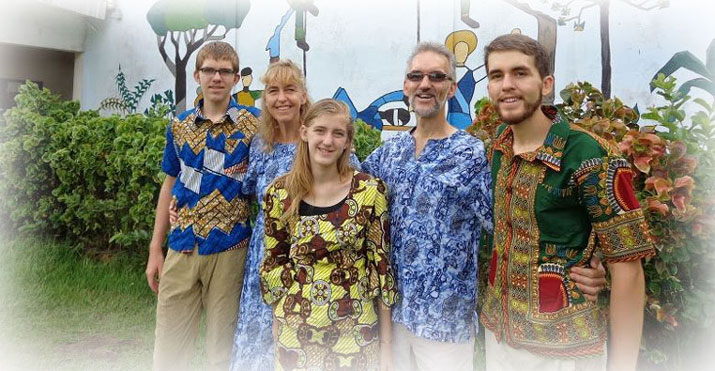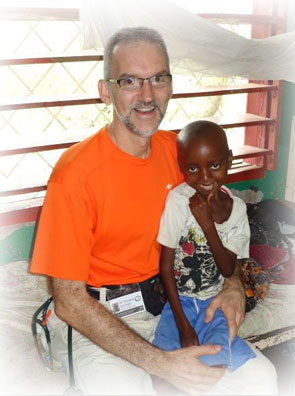Congo
2015
Mbote! Nsango nini? Malamu (Lingala) … Bon jour! Comment ca va? Ca va bien… (French)
These are a few of the common greetings we heard daily as I and my family immersed ourselves in the culture and people of Impfondo, Congo, during a recent medical missions trip. While many of our family and friends in the states were experiencing a deep, deep, freeze, we were at the opposite end of the thermometer sweltering in the heat and humidity of the equatorial rain forest We had the privilege of spending nearly 3 months serving the needy at a remote jungle hospital in Africa from January through March 2015. Through this time we were stretched in many ways, and found ourselves depending fully on God’s strength to accomplish the tasks to which we were called.
My wife Jennifer and I had met a young man at Houghton College back in the 1980s, now Dr. Joseph Harvey, who as a child had a vision of becoming a missionary doctor to the people of the Republic of Congo in Africa. God kept him focused on that vision and brought it to fruition after many years of prayer, preparation and dedication. That hospital is called Pioneer Christian Hospital (PCH) and is located in Impfondo, a remote town in the heart of the jungle along a riverbank in the northern part of the Republic of Congo. Dr. Harvey and his wife Becky, along with several other missionaries, now run this small rural hospital through the help of Global Outreach mission. It was a privilege for me, my wife Jennifer, and three of our children, Zachary (21), Joshua (16) and Olivia (14), to spend that time serving the Lord in the Congo at this African hospital having watched the marvelous story of its development unfold over the last 20 years!

Their website explains: ‘Congo’s Pioneer Christian Hospital is now a 60-bed general mission hospital in the heart of the Congo River Basin Rainforest. The mission of Pioneer Christian Hospital is to provide health and hope to those who need it most. It serves as a referral center for an estimated population of 300,000 people. The hospital aims to offer healing to the whole person, integrating physical, social, and spiritual treatment as needed. As a result, PCH is having a positive impact on the mortality and morbidity of the entire region through the medical, surgical, and chaplaincy services provided, having been open since 2006.’ For more detailed information you can review their website at congohospital.org.
When you think of a hospital you probably picture a modern, temperature-controlled, antiseptic-smelling, linoleum-tiled, multilevel building with remote controlled hospital beds, privacy curtains, a TV mounted on the wall and a rolling bedside stand for your smartphone, along with magazines, ice water and nutritious meals delivered three times a day. Doctors, nurses and other support personnel you expect to be readily available along with state-of-the-art diagnostic equipment, lab tests and medicines.

Well, a mission hospital in the hot, steamy rain forest is quite a different picture indeed! PCH is actually a group of about 15 cabin-sized buildings. Each one is dedicated to a specific type of patient–pediatrics, adult male, adult female, obstetrics, surgical, etc. These structures are all in the middle of a large, grassy area connected by sidewalks and surrounded by a privacy wall, since the original intent for the place was a communist youth training camp! If you were admitted there, you would have a
bare foam mattress and mosquito net provided. The cool concrete floor would be covered with the grass mat of a family member who would stay to provide all of your necessary non-medical care (called the ‘guard de’ malade’). Your food would be cooked over an open fire. Your laundry would be done in a bucket at a communal spigot and spread on the grass to dry. A bucket of water splashed over your head would serve as a shower while a metal-sheeted outhouse with a bare hole in the floor would be your toilet. Privacy would be virtually non-existent. During the day, you would share your space with cockroaches, ants, giant centipedes, while hearing the sound of thousands of weaver birds nesting outside. As quickly night falls at 6pm, the suddenly blackened sky would be filled with bats darting after malaria-laden mosquitoes while frogs croak and insects thrum. Although there is a skeleton crew of full- time missionaries and native health care workers to help manage your care, they are often overwhelmed by the sheer number and complexity of patients needing care. Medicines, medical supplies and diagnostic tests would be hit and miss. When there is electricity, donated blood can be kept cold, and respirators and oxygen can be used. It is amazing to see the resiliency and healing power that God has given the native folks who have endured great trauma, disease, and poverty, but all too often the sound of wailing is heard as another loved one succumbs to death.
I was stretched medically as I managed difficult obstetrics cases and found myself in the operating room quite frequently, which was pressing my limits as a physician, since I am not a trained surgeon. The stifling heat, humidity, frequent headaches and language barriers all made these things even tougher. But I was able to see Proverbs 3:5-6 come alive as I did indeed not lean on my own understanding but in all my ways acknowledged my utter dependence on God, and God truly did make my paths straight. I found the strength to make it through difficult and uncomfortable situations, both through the Lord’s help and the provision of other doctors there to help. We would see and treat many tropical diseases like malaria, tuberculosis, HIV and malnutrition on a daily basis, as well as deal with many trauma cases either from work injuries in the jungle, or more frequently, motorcycle accidents due to the large number of these vehicles traveling on the limited roads making money by using them as taxis. I was also able to teach my son Zachary some clinical skills as we worked together on some patients, which was exciting as he was heading towards entering his final 27 months of education to become a physician assistant once back in the states. By the way, I will add that there was no Ebola in the Congo, as many of my patients quickly jumped to that question when discussing our opportunity to travel to Africa.
Although the Bible came to life for us in many ways, we were all challenged and blessed by “living out ” Matthew 25:35-40: “For I was hungry and you gave me something to eat, I was thirsty and you gave me something to drink, I was a stranger and you invited me in, I needed clothes and you clothed me, I was sick and you looked after me, I was in prison and you came to visit me. Then the righteous will answer him, ‘Lord, when did we see you hungry and feed you, or thirsty and give you something to drink? When did we see you a stranger and invite you in, or needing clothes and clothe you? When did we see you sick or in prison and go to visit you? The King will reply, ‘Truly I tell you, whatever you did for one of the least of these brothers of mine, you did for me.’”
In early February, we were introduced to Nadege (pronounced ‘Na dej’), an 18 year old Aka (pygmy) girl who was very ill. She was propped up on one elbow on the hard dirt floor of a dilapidated mud hut. Her naked body was wracked with disease and her legs and belly were swollen with fluid. She couldn’t walk or care for herself and had just been ignored. Her own parents had died so an uncle took her in but he often drank and would verbally abuse her.
Nadege was brought to the hospital on a stretcher in the back of Mama Sarah’s jeep to receive the care she so desperately needed. (Mama Sarah is a wonderful long term missionary nurse with a heart of gold). We took on the responsibility of being Nadege’s “guard de malade”. We daily brought her clean water and food, washed her dishes and laundry at a common water faucet, emptied her

commode at the outhouse, and tried to keep her room as free as possible of the tiny teeming insects. It was challenging, it was humbling and it was rewarding. There were plenty of days, honestly, when we did it out of duty and sheer commitment, but together as a family, we took care of her needs, and this taught us much about true servanthood. After weeks of caring for her, it was very hard to leave her behind but we had a time of prayer together and assured her that Mama Sarah, Simone and others in the church would be there to look after her long term. To see the transformation of this emaciated, neglected young lady into a woman with a smile on her lips and the sparkle of hope in her eyes was so beautiful!
There was so much more that I could share about our time there, but that will have to be left for another time. Overall, we are grateful for the opportunity to serve the Lord by serving a needy group of people in the remote jungles of the Congo, and to learn so many lessons of trust and faith in our God. We thank all of our patients who were willing to accept any inconveniences of my having been absent for 3 months, and we especially thank my partners and staff of Westfield Family Physicians and Great Lakes Medical Research, who so wonderfully stepped up and filled in for me while we were gone!
Blessings,
Dr. Tim and Jennifer Kitchen, and family
Of note, if anyone is interested in more details of our time there, click here for a collection of our emails to our supporters while we were away.
